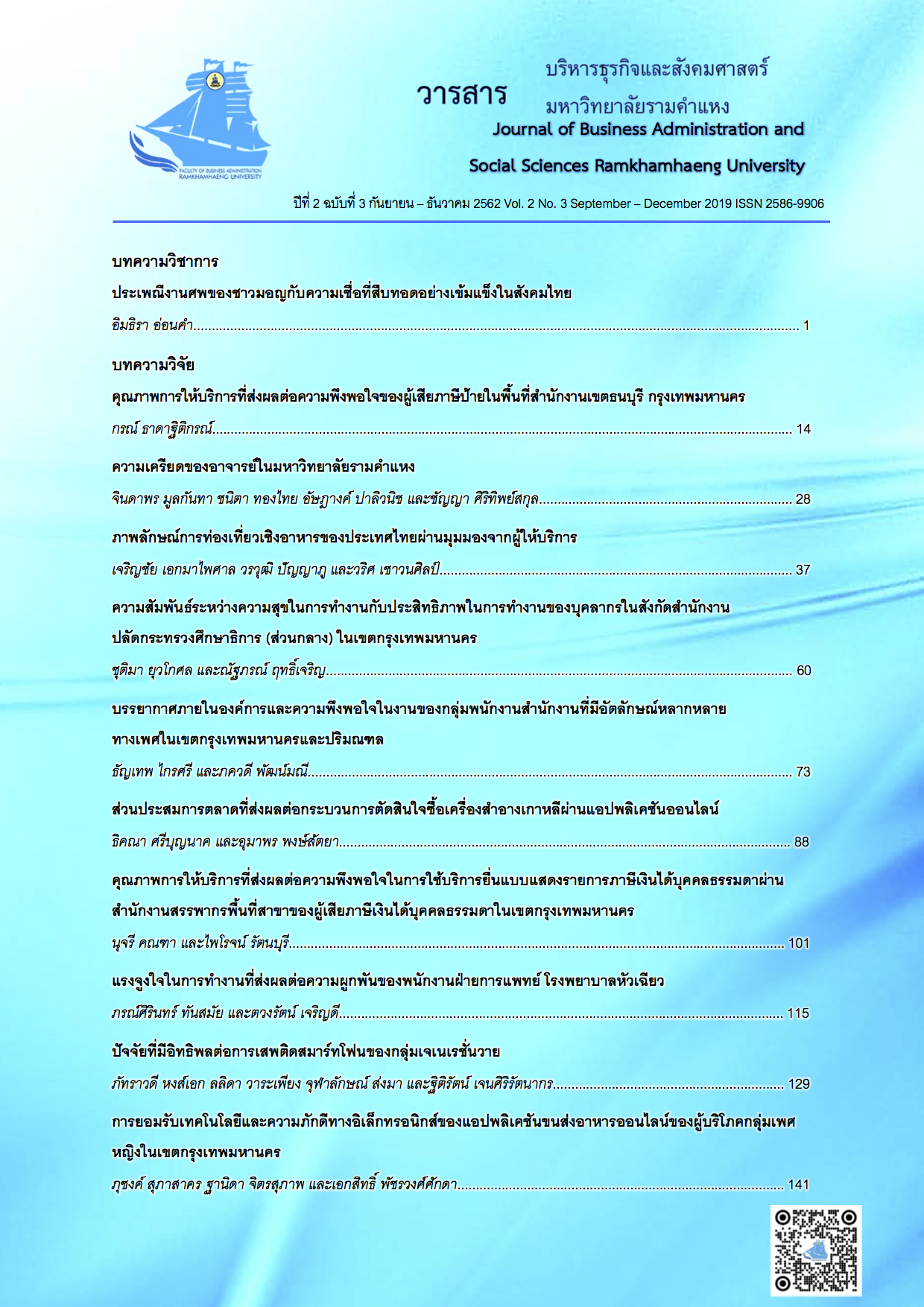Organizational Climate and Job Satisfaction of Office Workers with Various Gender Identities in Bangkok Metropolitan Region
Main Article Content
Abstract
In this research investigation, the researchers compare job satisfaction of the office workers with various gender identities (LGBT) based on the differences in demographic factors. The researchers examine the influence of organizational climate on job satisfaction of the office workers under study.
It was found that the highest proportion of questionnaire respondents were gay, single, aged between 30 and 39 years, Buddhist, with a bachelor’s degree, a monthly income of 35,000-50,000 baht, and work experience of five to eight years. It was also found that the perception of organizational climate was at a high level with the mean of 3.46 and job satisfaction at a high level with the mean of 3.97. The multiple regression analysis found that organizational climate exhibited the influence on job satisfaction at the statistically significant level of .05. The practical aspect (Beta = 0.708) exhibited a higher weight than the attitude aspect (Beta = 0.405). The coefficients were directly positive.
Article Details
เนื้อหาและข้อมูลในบทความที่ลงตีพิมพ์ในวารสารบริหารธุรกิจและสังคมศาสตร์ มหาวิทยาลัยรามคำแหง ถือเป็นข้อคิดเห็นและความรับผิดชอบของผู้เขียนบทความโดยตรง ซึ่งกองบรรณาธิการไม่จำเป็นต้องเห็นด้วย หรือร่วมรับผิดชอบใดๆ
บทความ ข้อมูล เนื้อหา รูปภาพ ฯลฯ ที่ได้รับการตีพิมพ์ในวารสารบริหารธุรกิจและสังคมศาสตร์ มหาวิทยาลัยรามคำแหง ถือเป็นลิขสิทธิ์ของวารสารบริหารธุรกิจและสังคมศาสตร์ มหาวิทยาลัยรามคำแหง หากบุคคลหรือหน่วยงานใดต้องการนำบทความทั้งหมดหรือส่วนหนึ่งส่วนใดไปเผยแพร่ต่อ หรือเพื่อกระทำการใดๆ จะต้องได้รับอนุญาตเป็นลายลักษณ์อักษรจากวารสารบริหารธุรกิจและสังคมศาสตร์ มหาวิทยาลัยรามคำแหง ก่อนเท่านั้น
References
พิมลพรรณ อิศรภักดี. (2558). ต่างวัยต่างทัศนะต่อความหลากหลายทางเพศในสังคมไทย. สืบค้นเมื่อ 2 พฤศจิกายน 2562, จาก http://www.ms.ipsr.mahidol.ac.th/ConferenceXI/Download/Book/447-IPSR-Conference-A04-fulltext.pdf
ภาวิณี กาญจนาภา. (2559). พฤติกรรมผู้บริโภค. กรุงเทพฯ: สำนักพิมพ์มหาวิทยาลัยศิลปากร.
บุษกร สุริยสาร. (2557). อัตลักษณ์และวิถีทางเพศในประเทศไทย. กรุงเทพฯ: องค์การแรงงานระหว่างประเทศ.
สิรธันย์ วดีศิริศักดิ์. (2555). แนวทางในการพัฒนาความงามฉลาดทางวัฒนธรรมเพื่อสร้างภาวะผู้นำขององค์การธุรกิจชั้นนำของประเทศไทย. ดุษฎีนิพนธ์บัณฑิต, มหาวิทยาลัยราชภัฏวไลยอลงกรณ์ ในพระบรมราชูปถัมภ์.
อรสา ใจจินา และภิญญาพันธ์ ร่วมชาติ. (2556). อิทธิพลของปัจจัยส่วนบุคคลและการสนับสนุนทางสังคมต่อความเหนื่อยหน่ายในการปฏิบัติงานของบุคลากรสาธารณสุขผู้รับผิดชอบงานสุขภาพจิตและจิตเวช ในพื้นที่เครือข่ายบริการสุขภาพที่ 3. วารสารวิชาการศิลปศาสตร์ประยุกต์, 6(1), 2-7.
Allen, T. D. (2001). Family-supportive work environments: The role of organizational perceptions. Journal of Vocational Behavior, 58(3), 414-435.
Bartle, S. A., Dansby, M. R., Landis, D., & McIntyre, R. M. (2002). The effect of equal opportunity fairness attitudes on job satisfaction, organizational commitment, and perceived work group efficacy. Military Psychology, 14(4), 299-319.
Brown, W. B. & Moberg, D. J. (1980). Organization Theory and Management. New York: John Wiley and Sons.
Clark, A. E. (1996). Job satisfaction in Britain. British Journal of Industrial Relations, 34(2), 189-217.
Cochran, W. G. (1953). Sampling Techniques. Oxford: John Wiley and Sons.
Coomber, B. & Barriball, K. L. (2007). Impact of job satisfaction components on intent to leave and turnover for hospital-based nurses: A review of the research literature. International Journal of Nursing Studies, 44(2), 297-314.
Cooper, C. L. & Dewe, P. (2004). Stress: A Brief History. Malden, MA: Blackwell.
Cranny, C. J., Smith, P. C., & Stone, E. F. (1992). Job Satisfaction: How People Feel About Their Jobs and How It Affects Their Performance. New York: Lexington Books.
Cullen, M., & Smart, J. (1991). Issues of gay, lesbian and bisexual student affairs professionals. In N. J. Evans & V. A. Wall (Eds.), Beyond Tolerance: Gays, Lesbians, and Bisexuals on Campus (pp. 179-194). Lanham, MD: University Press.
Ellis, A. L. (1996). Sexual identity issues in the workplace: Past and present. In A. L. Ellis & E. D. B. Riggle (Eds.), Sexual Identity on the Job: Issues and Services (pp. 1-16). New York: Harrington Park Press.
Folger, R. & Konovsky, M. A. (1989). Effects and procedural and distributive justice on reactions to pay raise decisions. Academy of Management Journal, 32(3), 115-130.
Heaney, C. A. (1991). Enhancing social support at the workplace: Assessing the effects of the caregiver support program. Health Education Quarterly, 18(4), 477-494.
Hedges, J. N. (1983). Job commitment in America: Is it waxing or waning? Monthly Labor Review, 106(7), 17-25.
Jackson, P. (2000). An explosion of Thai identities: Global queering and re-imaging queer theory. Culture, Health & Sexuality, 2(4), 405-424.
Lee, C., Huan, S., & Zhao, C. (2011). A study of factors affecting turnover intention of hotel employees in Taiwan. Journal of Asian Economic and Financial Review, 2(7), 866 -875.
Liddle, B. J., Luzzo, D. A., Hauenstein, A. L., & Schuck, K. (2004). Construction and validation of the lesbian, gay, bisexual, and transgendered climate inventory. Journal of Career Assessment, 12(1), 33-50.
Litwin, G. H. & Stringer, R. A., Jr. (1968). Motivation and Organizational Climate. Boston: Harvard.
Maslow, A. H. (1954). Motivation and Personality. New York: HarperCollins.
Ojanen, T. (2009). Sexual/Gender Minorities in Thailand: Identities, Challenges, and Voluntary-Sector Counseling. Retrieved on October 26, 2019, from http://www.academia.edu/3120339/Sexual_gender_minorities_in_Thailand_Identities_challenges_and_voluntary-sector_counseling
Parker, R.J. & Kohlmeyer, J. M. (2005). Organizational justice and turnover in public accounting firms: A research note. Accounting, Organizations and Society, 30(4), 357-369.
Powers, B. (1996). The impact of gay, lesbian, and bisexual workplace issues on productivity. In A. L. Ellis & E. D. B. Riggle (Eds.), Sexual Identity on the Job: Issues and Services (pp. 79-89). New York: Harrington Park Press.
Robbins, S. P. (2003). Organizational Behavior. New Jersey: Pearson Education.
Sell, L. & Cleal, B. (2011). Job satisfaction, work environment, and rewards: Motivational theory revisited. Labour, 25(1), 1-23.
Singh, P. & Loncar, N. (2010). Pay satisfaction, job satisfaction and turnover intent. Relations Industrielles/Industrial Relations, 65(3), 470-490.
Steers, R. M. & Porter, L. W. (1979). Motivation and Work Behavior. New York: McGraw-Hill.
United Nations Development Program and U.S. Agency for International Development. (2014). Being LGBT in Asia: The Thailand Country Report. Bangkok.
Waldo, C. R. (1999). Working in a majority context: A structural model of heterosexism as minority stress in the workplace. Journal of Counseling Psychology, 46(2), 218-232.


